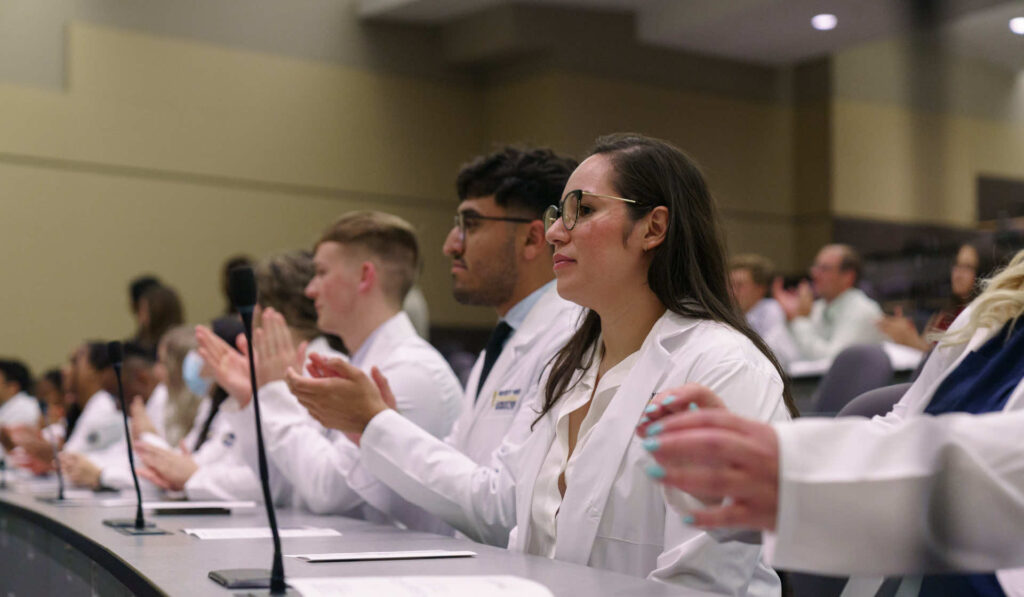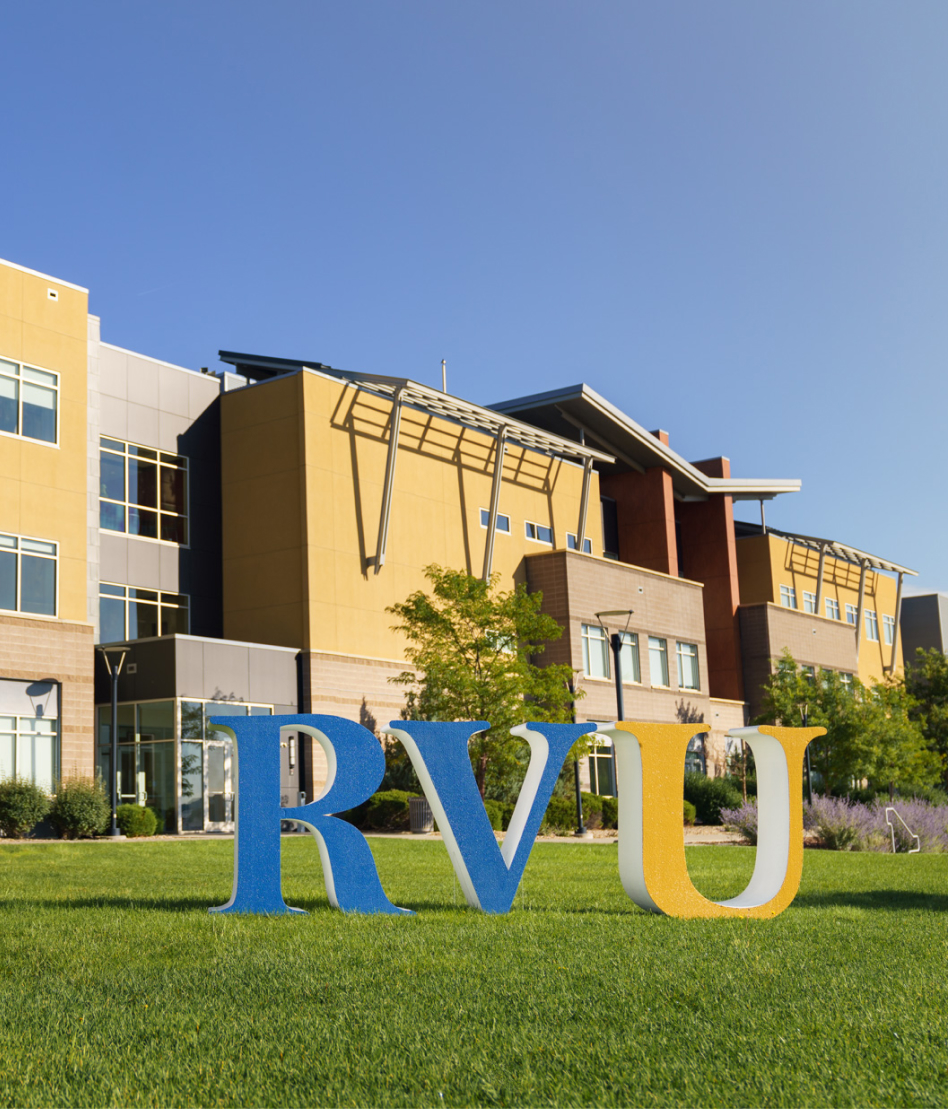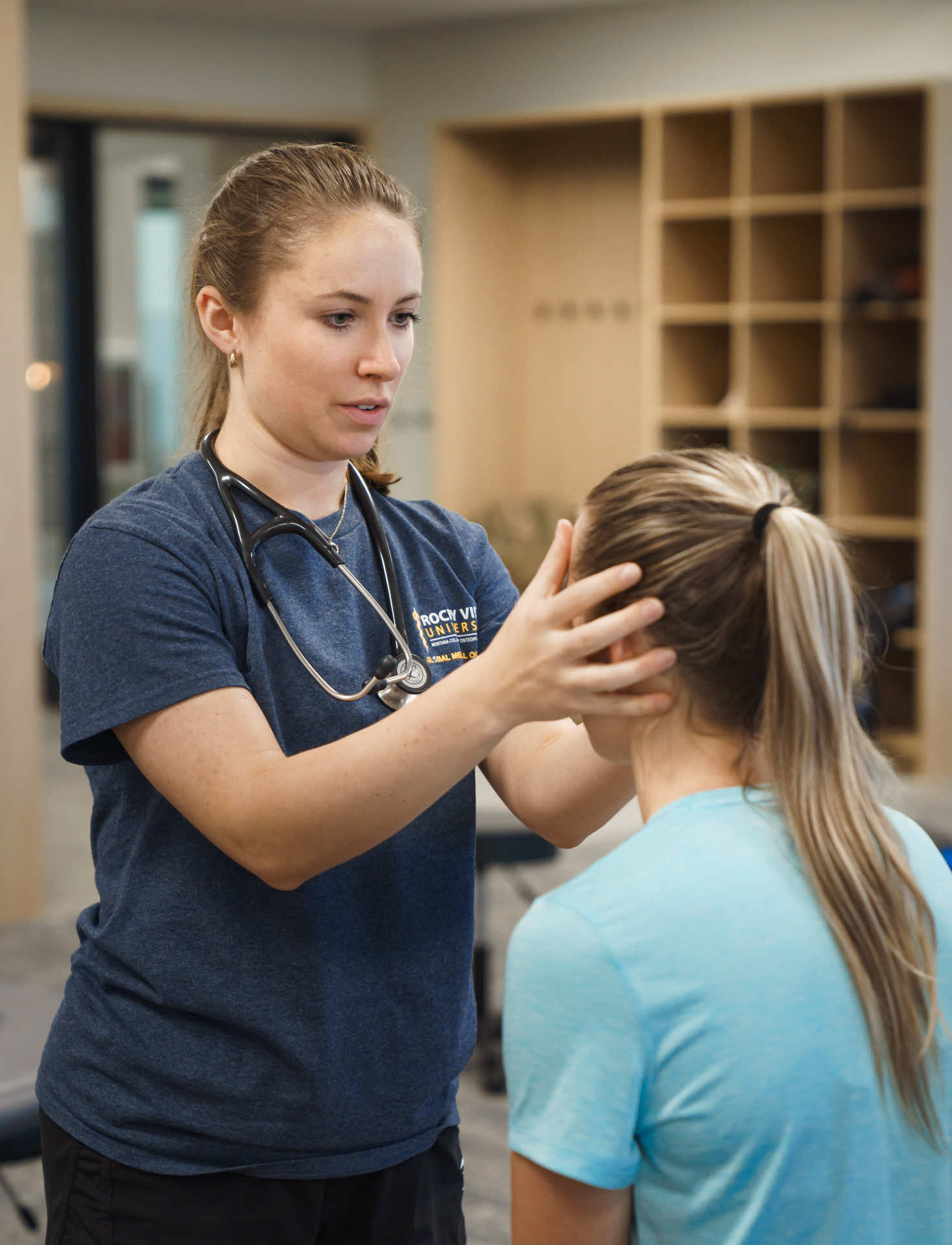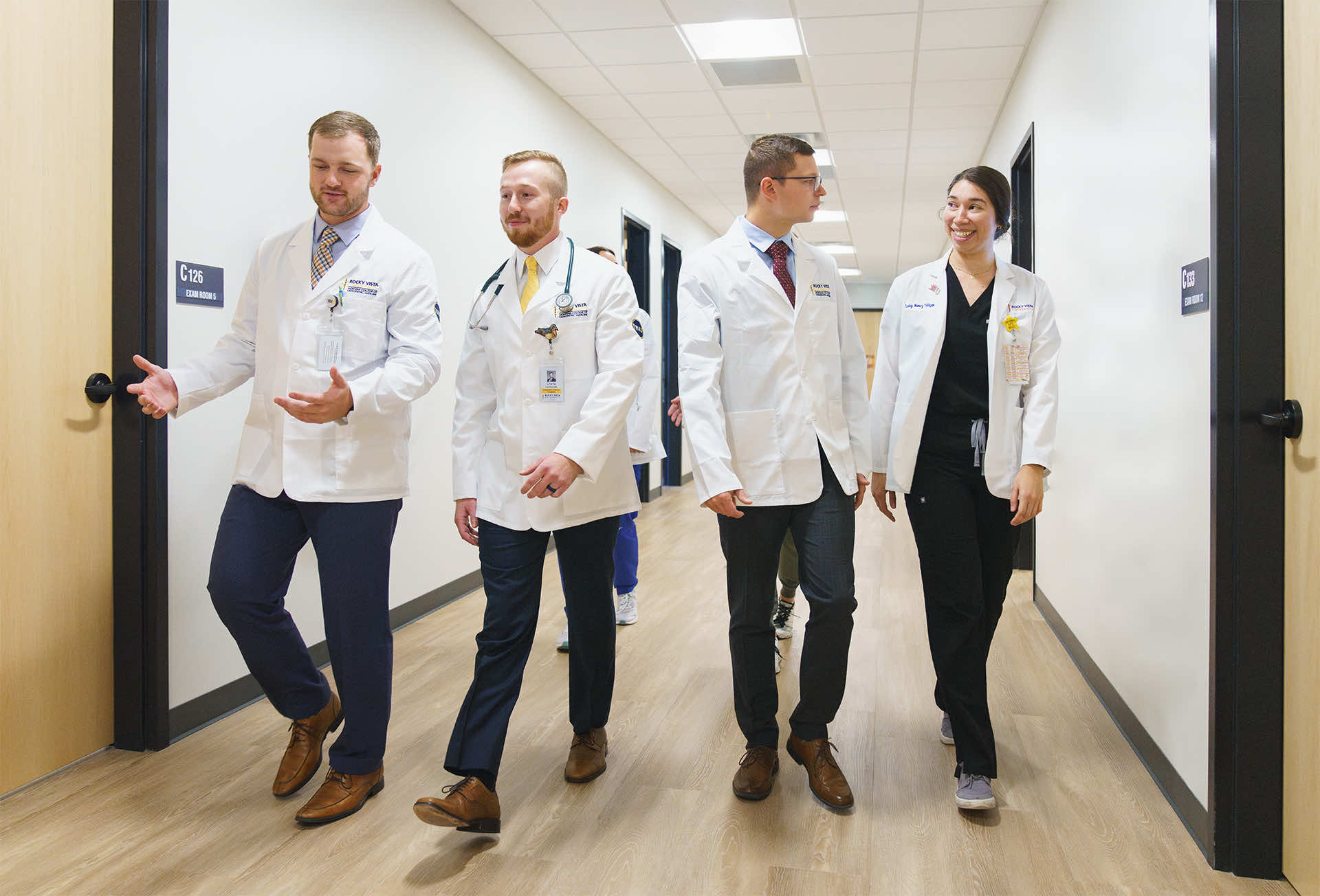Certified Registered Nurse Anesthesiologists (CRNAs) safely administer more than 58 million anesthetics to patients each year in the United States. As advanced practice registered nurses, CRNAs are among the nation’s most trusted professions. Today, more than 61,000 CRNAs (CRNAs and CRNA students) practice in every setting in which anesthesia is delivered: traditional hospital surgical suites and obstetrical delivery rooms; critical access hospitals; ambulatory surgical centers; ketamine clinics; the offices of dentists, podiatrists, ophthalmologists, plastic surgeons, and pain management specialists; and U.S. military, Public Health Services, and Department of Veterans Affairs healthcare facilities.
Rocky Vista University – DNAP Program Information
Doctor of Nurse Anesthesia Practice
Accredited by Council on Accreditation of Nurse Anesthesia Educational Programs
Seeking our first class of Nurse Anesthesiology students.
The Council on Accreditation of Nurse Anesthesia Educational Programs (COA) has granted full seven-year initial accredited status to the Rocky Vista University Doctor of Nurse Anesthesia Practice program.

Choose RVU’s brand new DNAP Program
We are thrilled to announce our DNAP program at our flagship Colorado campus. Like all the healthcare programs at RVU, we emphasize a close-knit community environment that helps every student achieve academic and clinical excellence.
The Council on Accreditation of Nurse Anesthesia Educational Programs (COA) has granted full seven-year initial accredited status to the Rocky Vista University Doctor of Nurse Anesthesia Practice program. Don’t miss this opportunity to come to mountainous Colorado to be a part of our inaugural DNAP class!
$50,000
Tuition Per Year
$4,676
Student Health Insurance*
May ’25
Start Date
Advance your nursing career in Colorado

Colorado Campus
Colorado Campus
Rocky Vista University Colorado location is located in a small town called Parker, just 20 miles southeast of Denver, which is a place rooted in history and heritage. The spirit of the west that lives here is matched in character only by our embrace of forward-thinking innovation. This rare balance offers experiences that are unique even for Colorado, making Parker the ideal one-day getaway. The community is known for its excellent school system, extensive biking and jogging trails, recreational facilities, dining, and entertainment, as well as a wide variety of arts and community events held throughout the year.
Explore CampusProgram Goals and Outcomes
Mission
The mission of the Doctor of Nurse Anesthesia Practice (DNAP) program at Rocky Vista University is to prepare highly skilled, compassionate, and innovative nurse anesthesia professionals through advanced education, exceptional clinical training, and a commitment to leadership, lifelong learning, and community impact.
Vision
The vision of the RVU DNAP program is to develop ethical nurse anesthesia leaders who advance safe, quality care through clinical excellence, critical thinking, and lifelong learning.
The RVU DNAP program offers resources for students to achieve personal and academic success, including:
- interaction with quality educators and researchers;
- a rigorous curriculum consisting of the application of active learning by faculty and students;
- the requirement of individual.
The RVU DNAP program promotes life-long learning and competency in its students via its emphasis on the development of educational skills and critical thinking, and through the encouragement of scientific inquiry.
The RVU DNAP program curriculum and learning environment integrates a strong foundation of biomedical knowledge with the professional, cultural, and ethical traits desired in its students and graduates.

Together, we will help you learn to:
- Apply patient care principles that maintain patient safety while administering anesthesia.
- Provide effective entry-level care across the peri-anesthesia continuum.
- Construct an anesthesia care plan based on scientific principles unique to each individual’s healthcare needs.
- Employ effective interpersonal communication skills.
- Employ leadership skills that foster inter- and intra-professional collaboration.
- Display professional behavior consistent with the role of a nurse anesthesiologist.
Ready to apply?
We are now accepting applications for the Doctor of Nurse Anesthesia Practice program.
Application Requirements
To ensure that our program maintains high standards and selects qualified candidates, we have established the following admission criteria:
- Bachelor’s Degree in Nursing (BSN): You must hold a BSN from an accredited institution.
- Current RN License: A current and unencumbered registered professional nurse and/or APRN in the United States or its territories and protectorates.
- Minimum One Year Critical Care Experience: Critical care experience must be obtained in a critical care area within the United States, its territories, or a US military hospital outside of the United States. A critical care area is defined as one where, on a routine basis, the registered professional nurse manages one or more of the following: invasive hemodynamic monitors (e.g., pulmonary artery, central venous pressure, and arterial catheters), cardiac assist devices, mechanical ventilation, and vasoactive infusions. Examples of critical care units may include but are not limited to: surgical intensive care, cardiothoracic intensive care, coronary intensive care, medical intensive care, pediatric intensive care, and neonatal intensive care. Those who have experiences in other areas may be considered provided they can demonstrate competence with managing unstable patients, invasive monitoring, ventilators, and critical care pharmacology.
- Certifications: You must possess ACLS, BLS, and PALS certifications, as well as CCRN certification or other specialty certification (e.g., ER or PACU).
- Minimum GPA of 3.0: Your undergraduate coursework should have a minimum GPA of 3.0 on a 4.0 scale.
- Organic Chemistry: An organic chemistry or biochemistry course taken within the last five years with a B grade or above from an accredited institution (with or without a lab).
- Official Transcripts: Submit official transcripts from all colleges and universities you attended.
- Personal Statement: Provide a personal statement outlining your goals, interests, and reasons for pursuing a DNAP degree.
- Letters of Recommendation: Submit at least two letters of recommendation from healthcare professionals, such as nurse managers, physicians, nurse anesthesiologists, or physician anesthesiologists.
- Shadowing Experience: Documentation of at least 16 hours of shadowing with a nurse anesthesiologist (CRNA) or physician anesthesiologist.
- Interview: Complete an interview with program faculty or administrators.
- GRE Score: Achieve a combined score of 300 on the Graduate Records Exam (GRE).
- Recommended undergraduate basic sciences: physics, pharmacology, statistics, college algebra, or similar math class within the last five years.
- Criminal Background Check: A criminal background check is required as part of the application process.
Message from the Program Director

Welcome to Rocky Vista University’s Doctor of Nurse Anesthesia Practice (DNAP) program. I am pleased that you have chosen to pursue your next academic and professional steps with us. At RVU, the success and well-being of our students, faculty, and staff has always been a top priority. The following pages describe our curriculum and the policies that will guide you on your path to receiving your DNAP degree.
The curriculum we have designed will give you a broad and deep exposure to scientific and anesthetic principles. It will require you to think critically about how science is applied to anesthesia practice. This includes learning about diversity, equity, and inclusion and preparing you for successfully working in diverse workplace settings with people from many backgrounds. Our dedicated and highly educated didactic and clinical faculty will challenge your ideas, inspire your curiosity, and develop your drive to enhance your learning. All of these aspects culminate in a DNAP program that will prepare you for successful entry into anesthesia practice.
We are committed to your education and aim to set a positive example for you, the student, by conducting ourselves with the utmost level of professionalism, compassion, and integrity. And we will expect you to do the same, as these are the most respected characteristics of healthcare professionals, researchers, and people.
I applaud you for embarking on this educational journey and I look forward to seeing what you will accomplish as part of RVU’s first DNAP class.
Sincerely,
Craig S. Atkins DNP, CRNA
Associate Professor and Program Director, Doctor of Nurse Anesthesia Practice
Rocky Vista University
Explore helpful program information
What is a CRNA?
Technical Standards
Rocky Vista University Doctor of Nurse Anesthesia Practice (DNAP) Program Technical Standards Required for Admission, Matriculation, and Progression
Introduction
Rocky Vista University (RVU) maintains a strong institutional commitment to equal educational opportunities for qualified applicants and students with disabilities. We collaborate with students to develop innovative ways to ensure accessibility and strive to create a respectful, accountable culture through our confidential and specialized disability support. Technical standards are required to engage in the program fully. Students’ competency related to learning objectives throughout and pertaining to their level of education will be addressed by the individual program. These technical standards are not intended to deter any candidate for whom reasonable accommodation will allow the fulfillment of the complete curriculum. RVU encourages students with disabilities to disclose and seek accommodations.
Seeking Americans with Disabilities Act (ADA) Accommodations
Prospective and enrolled students seeking accommodations engage in an interactive and confidential process with a Disability Officer to determine reasonable accommodations to ensure equal access. This process is informed by RVU’s commitment to inclusive excellence and the knowledge that students with varied types of disability can become successful healthcare professionals. Students are encouraged to submit requests for reasonable accommodations as early as possible, given the time required to process those requests. Accommodations may not be applied retroactively and may not fundamentally alter the nature and objectives of the program. Additionally, accommodations are generally not provided while requests are being reviewed/processed. Therefore, early disclosure is strongly encouraged for those requesting disability-related adjustments or modifications.
If you are an applicant, accepted student, or enrolled student with a disability who may require accommodations, we encourage you to contact the Office of Disability Services via [email protected]. Additional information regarding disability resources at RVU is available on our website.
Fulfilling Technical Standards
RVU approaches technical standards and accommodations on a non-discriminatory basis that is consistent with its values of equity and inclusion. This approach is also in accordance with legal requirements as outlined in the Americans with Disabilities Act of 1990, the Americans with Disabilities Act, as amended, and the Rehabilitation Act of 1973, as amended. To matriculate and remain in an RVU educational program, the specific program’s technical standards (delineated below) must be met with or without reasonable accommodations (i.e., students who have and students who do not have accommodations must meet all applicable technical standards). Students must be able to participate in all required activities necessary to meet the educational objectives of each course and of the collective program. While enrolled at RVU, fulfilling the technical standards does not guarantee that an applicant, student, or graduate will be able to fulfill the technical requirements of any specific residency program, employment, future training programs, or other pursued opportunities.
RVU DNAP Program Technical Standards
Immunizations
Students must satisfy all requirements for immunizations at the time of admission and throughout their time as an RVU student. Failure to do so will prevent matriculation or, in the case of an enrolled student, lead to dismissal. For specific information, please see “Health Records/Immunizations” of the Student Educational Records section of this Handbook.
Observation
Students must be able to obtain, gather, and synthesize information in didactic and clinical settings. This includes but is not limited to lectures, lecture supplemental materials, labs, physical exams, interviews, and raw diagnostic representations of physiologic data (e.g., radiology images, echocardiogram, ECGs, lab results, microscopic images). Students must have the individual capacity to assess a patient and evaluate findings accurately. These skills require the use of vision, hearing, and touch, or their functional equivalents.
Communication
Students must be able to communicate with others in order to elicit information, to detect changes in mood and activity, and to establish a therapeutic relationship. Students must exhibit interpersonal skills to accurately communicate with others. Students must be able to clearly, accurately, and sensitively record information obtained through communication. Students must demonstrate effective communication, participation, and collaboration with all members of a multidisciplinary health care and educational team across various communication mediums (e.g., in-person, Zoom, written). English is the primary language of the RVU DNAP Program curriculum, and students are expected to have a level of proficiency that eliminates language as an access barrier.
Motor
Due to the clinical nature of the RVU DNAP program, all students must have the necessary gross and fine muscular movement, balance, and equilibrium to successfully perform anesthetic techniques (e.g., intubation, neuraxial anesthesia, regional anesthesia) and associated procedures (e.g., central line placement).
Intellectual, Conceptual, Integrative, and Quantitative Abilities
Students must possess conceptual, integrative, and quantitative abilities, including measurement, calculation, reasoning, analysis, and synthesis. Problem solving, the critical skill necessitated by all RVU programs, requires these intellectual abilities. In addition, students must be able to observe and comprehend three-dimensional relationships and to understand the spatial relationship of structures. Students must be able to be present, engage, and participate in all required activities to the extent necessary to achieve all activity objectives and outcomes. Students must be capable of extended periods of intense concentration and attention.
Behavior and Social Abilities
Students must have the emotional health required for full use of their intellectual abilities, the exercise of good insight and judgment, and the prompt completion of all responsibilities attendant to the demands of the educational program. Students must have the capacity to develop mature, sensitive, and effective relationships with members of the internal and external RVU community (e.g., peers, faculty, staff, patients, health care professionals). Students must be able to tolerate physically and mentally taxing workloads and to function effectively under stress. They must be able to adapt to changing environments, display flexibility and professionalism, and have the capacity to function successfully and perform in the face of uncertainties inherent in the clinical nature of the RVU DNAP programs.
Ethical and Legal Responsibilities
Students must maintain, demonstrate, and display high ethical and moral behaviors commensurate with being a productive, compassionate, professional member of society in all interactions (e.g., faculty, staff, peers, patients, the public). Students are expected to have the cognitive ability to understand the legal and ethical aspects of the Nurse Anesthesiology profession and the capacity to act according to the relevant laws and ethical standards.
Matriculation Process
After receiving the initial offer of provisional admission to the DNAP, candidates must fulfill the conditions outlined in the matriculation agreement, including:
- Payment of a $1000 seat fee to secure your admission and clinical site as stated above. Deposits will be applied to tuition upon matriculation.
- Successful passage of a drug screen and background check. Both services are to be scheduled and managed through PreCheck and are to be completed by the dates specified on the matriculation agreement. An applicant who has a deficiency or abnormality discovered on either screening will be referred to a sub-committee for further investigation.
- Completion of required medical and immunization documents to be scheduled and managed through SentryMD and to be completed by the dates specified on the matriculation agreement.
- Enrollment in the medical insurance plan provided by the University or submission of a waiver demonstrating proof of comparable coverage.
- Any other requirements outlined in the matriculation agreement.
Transfer of Credits
Each DNAP school’s curriculum is unique and based upon that school’s longitudinal timetable. The DNAP curriculum at RVU is a three-year cohort-based, longitudinal course of study in which the coursework builds upon previously learned precepts. Therefore, transfer requests are not accepted.
Additional Resources
The RVU DNAP is applying for accreditation by the Council on Accreditation of Nurse Anesthesia Educational Programs (COA). The program’s review by the COA is scheduled for January 2025.
Council on Accreditation of Nurse Anesthesia Educational Programs (COA)
10275 W. Higgins Rd, Suite 906 / Rosemont, IL 60018-5603
Phone: (224) 275-9130
Website: https://www.coacrna.org
Email: [email protected]
To find a list of COA-accredited programs, visit https://coacrna.org
Meet the people who can be by your side
At RVU we foster an emphasis on community that drives positive outcomes for our students, and the faculty and staff play a key role in that culture. Our doors—and inboxes—are always open.

We’re looking forward to welcoming you
Contact the Office of Admissions
*All students are required to have health insurance. Students will be automatically enrolled in and billed for the RVU Student Health Insurance Plan unless they provide evidence of equivalent coverage prior to the waiver deadline date. Please contact the Office of Student Financial Services for more information.
